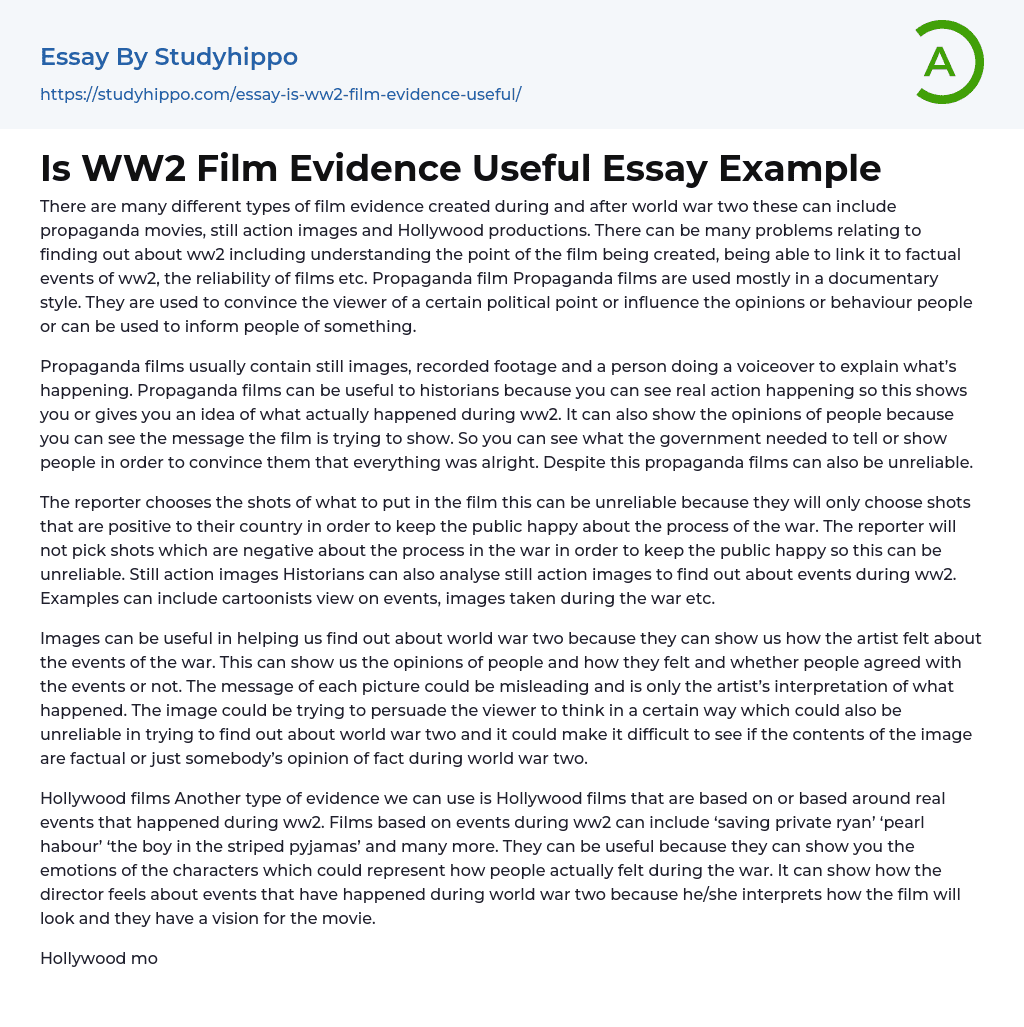A variety of filmic materials, including propaganda films, static action pictures, and Hollywood movies emerged during and post world war two. These sources, while abundant, present several challenges when used for learning about WW2. Such challenges involve understanding the objective of the film, relating it accurately to the historical events of WW2, and questioning the authenticity of these films. Notably, propaganda films often adopt a documentary format. Their primary use is to sway viewers towards a particular political standpoint, manipulate their thoughts or actions, or to shed light on certain matters.
Generally, propaganda films utilize still pictures, authentic video footage, and narrated commentary to portray unfolding incidents. Such movies can be precious assets for historians since they record actual events, thus offering a glimpse into the genuine happenings of World War II. They can also mirror the pr
...evalent mood of that era as they tend to communicate a specific viewpoint or message. As such, these films can disclose government strategies employed to reassure society and maintain stability. Nevertheless, their credibility may occasionally be dubious; hence one should approach them with caution.
The choice of footage included in a film by a reporter may not necessarily provide an accurate depiction of events, as they might only select scenes that portray their country in a favorable light, thus maintaining public contentment regarding the war progression. This selection bias could lead to an unreliable presentation as it might omit negative perspectives on the war process. Additionally, historians may analyze static action pictures to investigate World War II events. These images could range from cartoons reflecting the events to photographs taken during the war.
Pictures are instrumental in contributing to our
understanding of World War II as they reflect the artists' perspectives and feelings towards the war events. These views offer insight into the sentiments and agreements or disagreements of people towards those happenings. However, the interpretation depicted in each image might not be entirely accurate as it is solely based on the creator's viewpoint. The artwork could potentially sway the observer's thought process, undermining its reliability as a source of information about World War II. It can also muddle the distinction between factual content and personal portrayals of the events that occurred during World War II.
Another form of proof we can utilize are Hollywood movies that are predicated on, or revolve around true incidents that transpired during World War II. Movies like 'saving private ryan', 'pearl harbour', and 'the boy in the striped pyjamas', among many others, are examples of these. These films can be useful as they portray the emotional experiences of the characters, which could echo the real emotions people went through during the war. Additionally, they reflect the director's perspective on events from World War II as it's up to them to interpret and visualize how the film will appear.
Hollywood films may sometimes lack reliability due to the filmmakers' tendencies to alter storylines to make them more engaging, intending to maximize their profits. This could lead to misrepresentations and misconceptions about the war, as key details may be modified or excluded to fit within an acceptable runtime and keep viewers interested. Closing.
In summarizing, I propose that film evidence can offer some insights for historians researching World War II. Such evidence could potentially reflect public sentiment and reactions to the situation, providing
a sense of how events influenced perceptions or responses. However, it doesn't necessarily offer a precise depiction of the actual events of the war. It could also be contended that film evidence is not highly beneficial as it presents subjective views which could potentially influence individuals' thoughts and opinions in a manipulated manner.
- Fascism essays
- D-day essays
- Bbc essays
- Broadcasting essays
- Documentary film essays
- Game of Thrones essays
- Lottery essays
- Oprah winfrey essays
- Reality Television essays
- 1920S essays
- 1950S essays
- 1960S essays
- 19Th Century essays
- 20Th Century essays
- Ancient Greece essays
- Bravery essays
- British Empire essays
- Civilization essays
- Colonialism essays
- Declaration of Independence essays
- Evidence essays
- Genocide essays
- Gilded Age essays
- Historical Figures essays
- Historiography essays
- History of the United States essays
- Letter from Birmingham Jail essays
- Louisiana Purchase essays
- Nazi Germany essays
- Rebellion essays
- Revolution essays
- Roman Empire essays
- Russian Empire essays
- The Columbian Exchange essays
- Vikings essays
- War essays
- What is History essays
- World History essays
- World Hunger essays
- Collaboration essays
- Dialogue essays
- Fake News essays
- Journalism essays
- Mass Media essays
- Media Analysis essays
- Media Bias essays
- Media Studies essays
- Message essays
- News essays
- Propaganda essays




